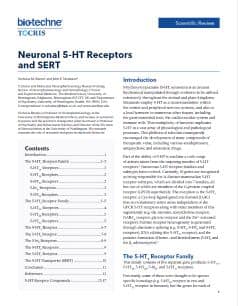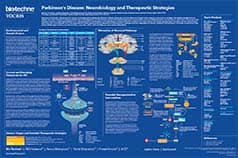5-HT1B Receptors
Serotonin 5-HT1B receptors are primarily located in the basal ganglia, striatum, hippocampus and vascular smooth muscle. 5-HT1B receptors play a role in thermoregulation, respiration, appetite control, sexual behavior and aggression.
5-HT1B Receptor Agonists |
|
|---|---|
| Cat. No. | 产品名称/活性 |
| 0703 | Anpirtoline hydrochloride |
| Highly potent 5-HT1B agonist; also 5-HT3 antagonist | |
| 0638 | CGS 12066B dimaleate |
| 5-HT1B agonist | |
| 1032 | CP 93129 dihydrochloride |
| 5-HT1B agonist | |
| 1317 | CP 94253 hydrochloride |
| Potent and selective 5-HT1B agonist | |
| 3586 | Sumatriptan succinate |
| 5-HT1A, 5-HT1B and 5-HT1D agonist | |
| 4657 | Zolmitriptan |
| Potent 5-HT1B/1D/1F agonist | |
5-HT1B Receptor Antagonists |
|
| Cat. No. | 产品名称/活性 |
| 0993 | Cyanopindolol hemifumarate |
| 5-HT1A and 5-HT1B antagonist; also β-adrenergic antagonist | |
| 1477 | GR 127935 hydrochloride |
| Potent and selective 5-HT1B and 5-HT1D antagonist | |
| 1054 | GR 55562 dihydrochloride |
| 5-HT1B antagonist | |
| 1242 | SB 216641 hydrochloride |
| Selective h5-HT1B antagonist | |
| 1221 | SB 224289 hydrochloride |
| Selective 5-HT1B antagonist | |
Serotonin 5-HT1B receptors are primarily located in the basal ganglia, striatum, hippocampus and vascular smooth muscle. 5-HT1B receptors play a role in thermoregulation, respiration, appetite control, sexual behavior and aggression.
External sources of pharmacological information for 5-HT1B Receptors :
Literature for 5-HT1B Receptors
Tocris offers the following scientific literature for 5-HT1B Receptors to showcase our products. We invite you to request* your copy today!
*Please note that Tocris will only send literature to established scientific business / institute addresses.
5-HT Receptors Scientific Review
Written by Nicholas M. Barnes and John F. Neumaier, this review summarizes the various serotonin receptor subtypes and their importance in mediating the role of serotonin in numerous physiological and pharmacological processes. Compounds available from Tocris are listed.
Parkinson's Disease Poster
Parkinson's disease (PD) causes chronic disability and is the second most common neurodegenerative condition. This poster outlines the neurobiology of the disease, as well as highlighting current therapeutic treatments for symptomatic PD, and emerging therapeutic strategies to delay PD onset and progression.

